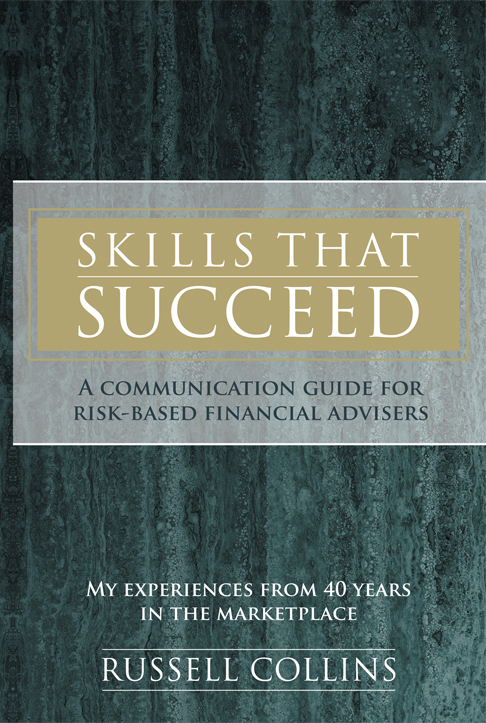How to Increase Your Life Insurance Sales Making Every Initial Meeting with a Prospect Successful
Engaging with Potential Clients – Four Questions People Subconsciously Want Answered
 When people meet with you for the first time, subconsciously they have four questions that need to be answered.
When people meet with you for the first time, subconsciously they have four questions that need to be answered.
They haven’t thought about these questions in advance but they cross their mind during that meeting. If they are answered, this will ensure that there is not only a second follow-up meeting, but also presents the immediate opportunity to develop a long-term relationship:
- Do I like you?
- Do I trust you?
- Are you competent?
- Are you the sort of person who will put my best interests before your own?
In addition to these four questions, I believe that a person would also have to be thinking to themselves “this adviser makes sense!” if there is going to be an ongoing relationship.
How to make every fact-finding meeting a success
What is it that an adviser needs to do in order to turn every fact-finding meeting into the successful development of a relationship and the sale of a risk insurance product? From my experience it depends on a number of key points:
- Preparation: What is done before the meeting.
- How you open the meeting on a positive note.
- The questions you ask during the meeting that enable you to give advice.
- The simple concepts you demonstrate in the meeting that educate your prospective clients on the recommendations you will be eventually putting to them.
- How you close the meeting on a positive note.
- Storytelling–to motivate people to take action.
Let’s have a look at each of these.
#1. Preparation
Read this previous post for details on how to increase your life insurance sales through preparation.
#2. Opening meetings on a positive note
When meeting with a person for the first time, what you say after “hello “sets the tone for the rest of the meeting. Your objective is to get control. Get through the formalities, get to the questioning and then get out of the way and listen!
It’s important that you develop a process that will get the opening of the meeting underway in as short and as positive a manner as possible after the “greeting” — something along the lines of: “I’m conscious that time is important to both of us, so is it okay if we get down to business straight away?” Talking about the traffic, football, basketball or the weather, wastes valuable time.
The next step in the “process” is to re-establish why you’re meeting. Whatever the purpose was in scheduling the meeting in the first place, it’s important to reiterate that specific purpose, which I believe immediately confirms that you have no hidden agenda. Something like “as I mentioned to you on the phone” OR “as we discussed recently”, the purpose of this meeting is to………….” and then reiterate those actual comments. (Always get agreement).
The final step in the “process” gives you the opportunity to introduce your questions, by saying something like: “I know very little about you and I’m not sure whether my ideas would be of value to you. However, we can establish this over the next hour or so if I could just run some questions past you which I have prepared especially for this meeting. Frankly, if we can’t establish an area of value to you in this meeting, then I can assure you that I won’t be pursuing the matter any further than that. Are you comfortable with that?” (Always get agreement).
#3. Questions asked that enable you to give advice
It’s important to ask “penetrating” questions i.e., those which require people to think before they answer, as opposed to questions that simply require a yes/no answer.
Penetrating questions are emotive and designed to promote discussion, seek the adviser ‘s advice in that first meeting and build relationships, rather than to sell products. In addition, you’ll find that in answering this type of question people actually provide you with information about problems they are probably not even aware exist at that point in time.
Within my book there are dozens of such questions for both the employed and self-employed markets.
#4. The simple concepts you demonstrate in the meeting that educate your prospective clients on the recommendations you will be eventually putting to them
In my fact-finding meetings there was a direct correlation between the questions I asked and the concepts I used to elaborate on those questions. This process allowed me to give meaningful advice in the first meeting.
In other words, I asked a question, listened for and then recorded the answer. Then at an appropriate time in the meeting I used a concept to explain to people why I asked that particular question. However, this explanation was in fact a “pre-presentation” on a recommendation that even at that early stage I knew I would make at a later date.
#5. How you close the meeting on a positive note
I believe it’s very important that you conclude the fact-finding meeting on a positive note. In my case I thanked them for giving me the opportunity to meet with them and then asked “Are you comfortable with what we discussed?” This was always met with a positive response–further confirmation that my preparation had been very worthwhile. I also think that it went a long way towards answering the question “Are you the sort of person who will put my best interests before your own?”
Next, I confirmed the confidentiality of our discussion which always received a positive acknowledgement.
I then reminded them of my opening comments: That if we couldn’t establish an “area of value to them” in the meeting I would not pursue the matter any further. I then obtained their agreement that we had in fact established several areas of value. Again, further assurance to me on the importance of my preparation.
I then mentioned I would summarise the details of our discussion in a file note and then within a few days forward them a copy for confirmation to ensure that “what I heard was what they said! If they were happy with the content, would they please sign and date where indicated and return it to me as confirmation for me to proceed with the preparation of my eventual recommendations”.
That file note was always most appreciated because in the main people didn’t take notes and they usually had no idea of the depth of discussion that would be taking place. Therefore, the file note was designed to be a summary which allowed them to not only reflect afterwards as to what was discussed but to also share with their partner, business partner or others in more detail than they would have been able to do by just relying on their own memory.
If I could point to one thing that increased my closing rate to 9 out of 10, it was the file note. This in effect acted as a pre-presentation vehicle and I believe it motivated people to really look forward to our next meeting and my eventual recommendations.
#6. Storytelling and Anecdotes
I cannot stress enough the importance of storytelling and anecdotes. Simply put advisers need to be good “storytellers”. There are two great advantages if you adopt this suggestion: First people can immediately empathise with situations similar to theirs. They might not come right out and say it at the time but you have given them something to think about between then and your next meeting – particularly if you mention the anecdote again in your file note.
The reason why the initial meeting is so crucial to your success in this industry is that this is where the biggest sale of all is made – the sale of you! If you don’t sell you in that first meeting, it’s highly likely there will be no second meeting. Therefore, the primary purpose of this meeting is to establish a relationship. And you do this by asking penetrating questions, listening to the answers and then recording the answers in an orderly manner. The secondary purpose of this meeting is, of course, to obtain information.
Tap into the 40+ years of experience Russell Collins shares in his book on the importance of developing communication skills which people will both understand and act upon; skills that will enable you to achieve an extraordinary level of success and will give you the opportunity to make a difference in people’s lives on a daily basis.

Order your audio book copy today!
Available also in e-book format worldwide or in hard copy format in Australia. See available formats.



